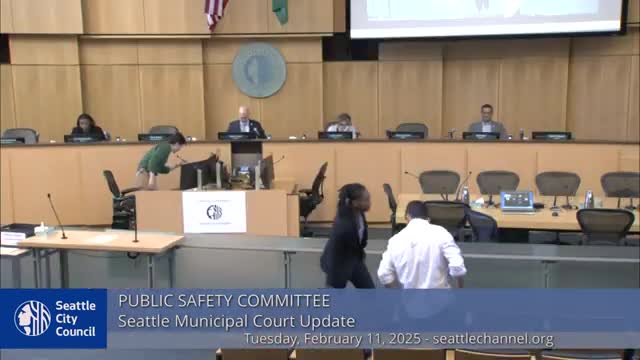LEAD program leaders describe outreach, outcomes and need for expanded lodging and shared data
Get AI-powered insights, summaries, and transcripts
Subscribe
Summary
Purpose Dignity Action and partner agencies briefed the Public Safety Committee on Law Enforcement Assisted Diversion (LEAD), reporting outcomes from street‑based case management and lodging‑based "CoLEAD" and urging system design, sustained funding and improved data sharing with law enforcement and prosecutors.
Representatives of Purpose Dignity Action (PDA) and partner agencies briefed the Seattle City Council Public Safety Committee on Feb. 11 about Law Enforcement Assisted Diversion (LEAD) and related place-based responses such as CoLEAD lodging and the Third Avenue project.
PDA leaders described LEAD as a public‑safety framework that pairs law‑enforcement diversion discretion with intensive, long‑term case management to reduce repeat criminal behavior and connect participants to housing and behavioral health services.
Why it matters: PDA and its subcontractors present LEAD as an evidence‑based alternative to routine charging and incarceration for many offenses tied to substance use, mental health and extreme poverty. Committee members asked how LEAD can scale, what state and federal funding guidance exists, and what more the city and region must do to prioritize housing and safety teams for high‑impact cohorts.
What presenters said - Program model: Brandy McNeil, deputy director at Purpose Dignity Action, said "LEAD is a public safety framework" that provides "long term intensive case management" and that case managers act as a "golden thread" to broker housing, treatment and legal supports for participants. - Referral pathways: McNeil explained three entry routes into LEAD — officer arrest diversions, officer social-contact referrals and community referrals — and stressed that officers exercise discretion and are not required to divert eligible people. - Evidence and evaluation: Lisa Dugard, co‑executive director at PDA, summarized University of Washington evaluations showing that LEAD participants in prior studies were "58 percent less likely to commit new crimes of any in any category" compared with control groups; she also cited favorable findings for CoLEAD lodging and a King County Auditor review that highlighted LEAD’s rigorous, data‑driven approach. - Scale and outcomes: Sam Wolf, LEAD program director, said street‑based providers had a combined caseload of just over 1,000 people at the end of 2024. CoLEAD — the lodging/hotel‑based pathway — had 257 active participants at the end of 2024 and logged intensive engagement: PDA reported 38,656 substantive case‑manager/client meetings in 2024. CoLEAD reported an over‑90% acceptance rate for people brought from the street into lodging and, when permanent housing resources are available, a greater than 70% successful move‑on rate. - Place‑based response and Third Avenue: PDA described the Third Avenue project as a pilot for place‑based milieu management that pairs direct stabilization with a contracted safety team (We Deliver Care/other providers). PDA said private‑sector partners and downtown businesses report the project has provided measurable neighborhood relief but that only small permanent‑housing cohorts (about 30 at a time) have been prioritized under current regional processes.
Funding and systems issues: Presenters said LEAD has historically operated with mixed local funding and limited state support until recent grants. They urged improved system design across first responders, public‑health partners and housing agencies, plus consistent investments in temporary lodging capacity and a 24/7 safety team model for high‑impact places.
Federal and statewide context: Dugard said LEAD has been recognized as a promising federal practice and that federal agencies including the Bureau of Justice Assistance and SAMHSA reference LEAD‑style diversion. She noted state legislation and the Recovery Navigator model have mirrored LEAD principles and that additional state funding opportunities now exist.
Committee reaction and next steps: Councilmembers praised LEAD’s data orientation and asked PDA for follow‑ups on scaling, how to prioritize permanent housing for high‑impact cohorts and how the committee can support system design and partnerships with SPD and the City Attorney. PDA leaders emphasized that improved real‑time information sharing and formal case‑conferencing between case managers, prosecutors and police would increase program effectiveness.
Ending: PDA asked the committee to consider system design and sustained funding to expand CoLEAD lodging and embed safety teams while councilmembers signaled interest in pursuing state and federal funding opportunities and tighter local coordination.
